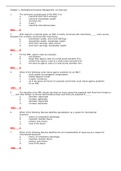Other
Practice Questions-International Financial Management Jeff Madura- Ch1-6
- Course
- Institution
- Book
This file includes practice questions for International Financial Management Jeff Madura- Ch1-6 inclusive of True or False and Multiple Choice Questions.
[Show more]



